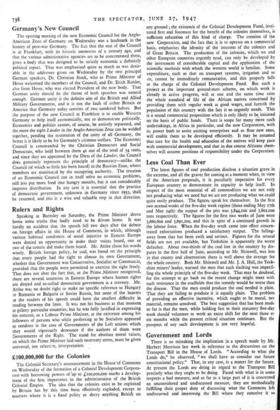Less Coal Than Ever
The latest figures of coal production disclose a situation grave in the extreme, and all the graver for coming at a moment when, in view of the American proposals, it is peculiarly imperative for emery European country to demonstrate its capacity to help itself. In respect of the most essential of all commodities we are not only not producing what we need but we are not producing what we could quite easily produce. The figures speak for themselves. In the first two normal weeks of the five-day week regime (those ending May 17th and May 24th) the output of the pits was 3,844,100 and 3,802,000 tons respectively. The figures for the first two weeks of June were 3,660,600 and 3,691,200, and this in spite of a continued growth in the labour force. When the five-day week came into effect concen- trated exhortations produced a satisfactory output. The falling- away from that has been swift and serious. Figures for the several fields are not yet available, but Yorkshire is apparently the worst defaulter. About two-thirds of the coal lost in the country by dis- putes in the first half of June, according to Mr. Shinwell, was lost in that county and absenteeism there is well above the average for the whole country. Both Mr. Shinwell and Mr. J. A. Hall, the York- shire miners' leader, warned the men that such slacking was imperil- ling the whole principle of the five-day week. That may be doubted, for the attempt to go back on the recent change might meet with such resistance in the coalfields that the remedy would be worse than the disease. That the men could produce the coal needed is plain. That they are failing to produce it is equally plain. The problem of providing an effective incentive, which ought to be moral, not material, remains unsolved. The best suggestion that has been made so far is that the men, while holding fast to their statutory five-day week should volunteer to work an extra shift for the next three or six months while the present critical situation continues. But the prospect of any such development is not very hopeful.


































 Previous page
Previous page